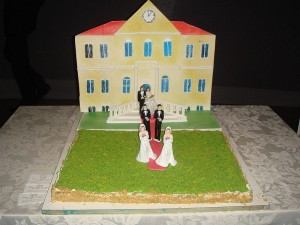The coming constitutional clash between traditional religion and homocentric secularism
 Matt Lewis nails the core issue when it comes to the LGBT crowd’s demands that shopkeepers engage in acts contrary to their religious conscience:
Matt Lewis nails the core issue when it comes to the LGBT crowd’s demands that shopkeepers engage in acts contrary to their religious conscience:
But let’s be honest about something else. This is really a surrogate battle. A much bigger one is coming.
[snip]
The reason conservative Christians are fighting this fight today is because it’s a firewall. The real danger, of course, is that Christian pastors and preachers will eventually be coerced into performing same-sex marriages. (Note: It is entirely possible for someone to believe gay marriage is fine, and to still oppose forcing people who hold strong religious convictions to participate — but I suspect that is where we are heading.)
Think of it this way. If you were a congregant in a church, wouldn’t you expect the pastor to marry you? Why should you be treated different?
Any pastor — if he or she wants to maintain the church’s tax status, that is — had better grapple with this now.
Whether the analogy is fair, or not, refusing to officiate a gay wedding can just as easily be called “denying service.” And it will predictably also be compared to the bad old days of Jim Crow — where racist Christians opposed interracial marriage (until the courts struck down state laws prohibiting biracial marriage).
Gay rights and religious liberty are on a collision course.
I’m too lazy to go through my archives now, but long-time readers will know that I’ve been saying this for years. In fact, just three years ago, I made precisely this argument using lawyer logic and the example of England:
I have said all along that the main problem with the gay marriage debate is that, by creating an entirely new bottom line (gay marriage) we’re going to see two bottom lines crash into each other. You see, traditional male/female marriage meshed nicely with the vast majority of traditional religious norms. Gay marriage, however, does not mesh with traditional religion. While Progressive churches and synagogues have opened their doors to gay marriages, more traditional ones, especially the Orthodox Jewish faith and the Catholic Church, have not done so.
When I’ve raised this concern to people, they scoffed. One liberal told me that, even though abortions are legal, the government has never gone toe-to-toe with the Catholic Church. He looked a bit taken aback, and had no response, when I pointed out that the Catholic Church doesn’t provide, or withhold, abortions; it simply speaks against them doctrinally. The Church does, however, marry people, and that leaves open the possibility that a gay couple will sue the church for refusing to perform a marriage service.
Others, while acknowledging that my point has a certain intellectual validity, say that it will never happen. I’m not so sure, especially after reading a story out of England involving a Pentecostal couple who were told that, as long as their religion held that homosexuality is not acceptable behavior, they could not foster needy children:
A Christian couple morally opposed to homosexuality today lost a High Court battle over the right to become foster carers.
Eunice and Owen Johns, aged 62 and 65, from Oakwood, Derby, went to court after a social worker expressed concerns when they said they could not tell a child a ‘homosexual lifestyle’ was acceptable.
The Pentecostal Christian couple had applied to Derby City Council to be respite carers but withdrew their application believing it was ‘doomed to failure’ because of the social worker’s attitude to their religious beliefs.
The couple deny that they are homophobic and said they would love any child they were given. However, what they were ‘not willing to do was to tell a small child that the practice of homosexuality was a good thing’.
What’s relevant to this post is that the judges explicitly held that homosexual rights trump religious rights:
Lord Justice Munby and Mr Justice Beatson ruled that laws protecting people from discrimination because of their sexual orientation ‘should take precedence’ over the right not to be discriminated against on religious grounds.
Admittedly, Britain does not have a First Amendment. However, as I noted above, First Amendment or not, our government bars, and (when Mormons are involved) actively prosecutes, polygamy. It does so despite the fact that polygamy was official doctrine for the Mormons and is official doctrine for the Muslims. Likewise, although Voodoo is recognized as a religion, we don’t let practitioners engage in animal sacrifice. In other words, First Amendment or not, the government will interfere in religious doctrine if it runs completely afoul of a bottom-line American value.
If gay marriage is deemed Constitutional, we suddenly have two conflicting bottom-line values — gay marriage and religious freedom. I’m not predicting how this will turn out. I’m just saying that, if I was the Catholic Church or an Orthodox synagogue, I’d start having my lawyers look at this one now.
I’m not usually a great strategist or long-term thinker, but it was easy to see this one coming. It’s not about homophobia. It’s about a clash between faiths: traditional religion versus homocentric secularism. The traditionalists have people who will willingly martyr themselves for their faith, while the secularists have people who will cheerfully force martyrdom on others. It remains to be seen (a) which is the more powerful impulse and (b) which resonates more strongly with Americans. Sadly, if I had to bet money on this today, I’d put my money on the secularists, who long ago successfully co-opted America’s cultural institutions: the news media, the entertainment world, all public primary schools, all colleges and universities, reform Jews, Presbyterians, and Episcopalians.
